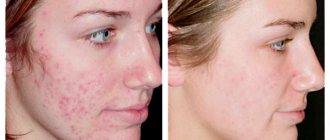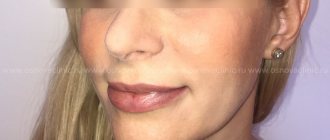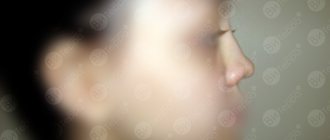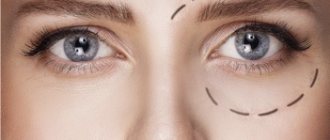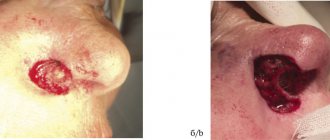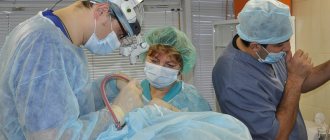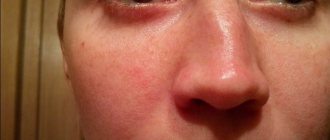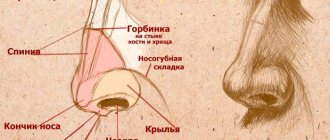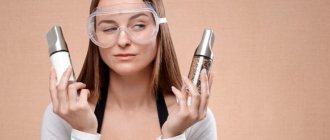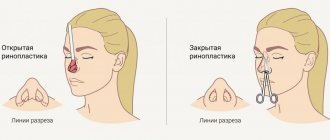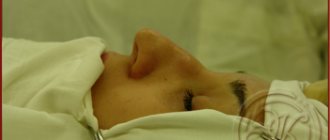How is surgery to correct a broken nose performed?
Since rhinoplasty is performed under general anesthesia, before it it is necessary to undergo tests standard for any surgical operation: clinical and biochemical blood tests, coagulogram, tests for HIV and AIDS, general urinalysis, ECG.
The operation lasts 2-3 hours. And includes the following steps:
- The surgeon makes incisions to gain access to abnormally fused tissue.
- An osteotomy is performed, that is, a medical, controlled fracture of bones and cartilage.
- The specialist manually gives the fragments an anatomically correct shape, simultaneously eliminating aesthetic defects at the request of the patient.
- Sutures and a fixing bandage are applied.
- The patient spends another 1-2 days in the hospital.
Is it possible to have a nose job at any age?
Is rhinoplasty performed in childhood and adolescence? Plastic surgeons most often do not perform such procedures on people under 18 years of age. Moreover, they advise waiting another two or three years for the bones of the facial skeleton to finally form. Ideally, the most suitable age is from 20 to 25 years.
In exceptional cases, a decision may be made to correct the shape of the nose at 17, 16, 15, and even at 14 years old, only if there are serious medical indications. The operation can also be performed on a small child when he cannot breathe through his nose at all and this interferes with his normal development, as well as when there is a serious birth defect or injury.
Until what age can a nose job be performed? According to experts, nose correction is acceptable at 40 years old, 50 years old, and even at sixty years old. The question is how the person will cope with the operation. Does he have any serious chronic diseases? There is a risk that they can lead to the death of the patient if one takes the risk of undergoing plastic surgery. Considering this point, doctors do not advise resorting to nose surgery after 45 years. Why?
At this stage of life, a person’s ability to restore damaged tissues significantly deteriorates , since the aging process has already begun. Even if there are no contraindications, rehabilitation and recovery after surgery will be much more difficult and much longer.
We also must not forget about the danger associated with the need to undergo general anesthesia. It is known that it is difficult for the body to tolerate, and at a more mature age it is perceived by a person much more difficult. Nasal surgery is performed very rarely under local anesthesia.
Is it possible to have rhinoplasty if you have a runny nose or a cold?
If a patient has a runny nose caused by a cold by the appointed day of plastic surgery, a good surgeon will postpone the operation until the person has recovered from his illness.
This is due to the fact that before the operation the human body must be strong enough to easily undergo rhinoplasty. And if he is sick, then the immune system is weakened and complications may arise.
If the runny nose is caused by allergies and rhinitis is in the acute stage, then the operation is also postponed. It is better to wait until the runny nose goes away.
What types of rhinoplasty are there?
Depending on the complexity of the correction, there are two techniques for performing the operation: closed and open. Closed plastic surgery is less traumatic, but limits the area of impact. However, most patients prefer this method due to the absence of postoperative sutures and a shorter rehabilitation period.
Open rhinoplasty is preferably performed in the presence of serious defects, since during this correction the surgeon can completely control the situation, having a greater view. There are also more opportunities to influence cartilage and bone tissue. When performing such an operation, a scar is left on the nasal septum, which practically disappears over time. The recovery period after surgery is longer and more difficult than with closed rhinoplasty.
How is rhinoseptoplasty different from rhinoplasty?
Rhinoplasty
is an aesthetic operation, the purpose of which is to correct the shape of the nose and eliminate congenital or acquired cosmetic defects in appearance.
Rhinoplasty is done at the request of the patient, and not for medical reasons. Septoplasty
is an operation to restore free breathing by straightening the nasal septum.
| Rhinoseptoplasty improves the aesthetics of the external nose while correcting a deviated internal nasal septum. Many plastic surgeons are unanimous in the opinion that when performing aesthetic correction of the nose, it is necessary to simultaneously straighten the deviated septum to obtain a predictable result and prevent deformation of the nose. |
Nose after rhinoseptoplasty (photo)
| Elimination of acquired deformation of the external nose. Photos after rhinoplasty were taken 9 days later. | Elimination of acquired deformation of the external nose. Photos of the result of rhinoplasty were taken one month after the operation. |
Is it possible to have rhinoplasty if you have hepatitis C?
Hepatitis C is an incurable infectious disease that affects the liver. It can be in an active or inactive phase.
Some plastic surgeons decide to perform surgery if the disease is in an inactive phase. This ensures a particularly serious approach to protecting medical staff and other patients from infection.
If the preoperative examination shows the presence of hepatitis C in the active phase, nose correction cannot be done .
Rhinoplasty: pros and cons.
Good morning!
I hardly write posts, but now I really needed the advice of an experienced Internet public. Half a year has passed since my previous journalistic opus: I wrote about breaking up with a man, then we got back together, in the spring we broke up again completely and without light sadness, so somehow there was no inspiration to write. So, over the May holidays, enjoying the state of Single&Fabulous, I studied marketing, read business books, and had meetings planned (including with boyfriends). Everything was fine, and one day while doing yoga, I thought, maybe I could record a yoga lesson and post it on Youtube (I’ve had these thoughts for a long time), solely for the purpose of checking how they make money from advertising (remembering Internet money from South Park) . I'm very mercantile.
Well, I filmed it...I looked...And I understood the meaning of the term cognitive dissonance. I always considered myself a beauty, I heard this from people, and I objectively assessed my appearance, and understood that it had a twist (the main highlight is my nose, yes, yes, we will talk about it), that I am a non-standard beauty, I am more Gisele or Kate than Heidi. And then I watched the video and realized that I was not Giselle after all... You can imagine how hard it was for me to accept the harsh reality.
And I thought, why not become more beautiful? and you can't fix your nose...
My nose is large, quite large, on Gossip in the comments they usually call them “that’s a snob.” The greatest resemblance to the profile of Lady Diana (in general, my type), it seems to me that I will have even more. But since adolescence I have not had complexes, other harmonious features and figure perfectly compensate for such a deficiency, I have not suffered from the lack of attention from men, and even now I consider myself very good (especially in combination with Scorpio magnetism).
But unconsciously, I still worry a lot about my appearance. For a photo, I choose the winning frame, and I know how to create a slim nose using filters. And as they say, your true face is what you see when the front camera accidentally turns on. It happens that you shy away. Well, our people are “kind”, one of my former colleagues (not a fashion model at all) asked to my face a couple of years ago: “Why don’t you do your nose?” Then, of course, she apologized, but the aftertaste remained. In general, we can continue endlessly. Bottom line: I signed up for plastic surgery, it is scheduled for the fall, next week I will have modeling, and due to the paperwork and money aspects, there will be no way back without material losses. I won’t mention the doctor’s name or the name of the clinic; the money issue is of course palpable, but that’s not the main thing; I trust the specialist as much as I trust myself.
There is fear, and very big, doubts too. This morning I woke up with the thought: do I really need it? After all, I don’t work on television, appearance is not my calling card. And in general, beauty is fleeting, and I have always believed that it is from within that what attracts people and circumstances comes. So it might be better to stop focusing on the external and work on your essence.
And therefore I would like to know the opinion of those gossips who had rhinoplasty done (or from the experience of friends). And please answer a few of my questions.
1) Have you become happier? Have you gained confidence in yourself? Has your life changed?
2) Was everything done correctly the first time or did you have to do it again?
3) Is it very painful? On a scale from 1 to 10. It somehow affected my health in the future. After surgery, I don’t want to feel an ache in my nose every time the weather changes.
4) Have you settled on rhinoplasty (or continued “improving”)? Have you worked with a psychologist before or since?
I understand that there are specialized sites, but I would not like to read stories about how long it takes for the cast to be removed and the swelling to subside, and “oh, I’m so happy, so happy” a week after the operation. Is it worth it in the long run?
And if there were unsuccessful cases, I would also like to read about them. Perhaps someone regretted their decision, and I also wonder why?
And so that the post carries an informative load, I will add before and after photos of celebrities.
This is what I don't want:
Always looking at Ivanka Trump, I think her nose is disproportionately small for her face. I thought it was mine, then I came across these photos, damn, why so tiny?
That's how I like it.
Thanks to everyone who subscribes.
And finally, photos of women who kept everything as is and are quite happy.
Wishing you self-confidence, love and happiness!
So are you for or against rhinoplasty?
Is it possible to have rhinoplasty if you have diabetes?
Diabetes mellitus is a complex disease that is caused by disturbances in the functioning of the endocrine system. It manifests itself in an insufficient amount of insulin in the blood. which leads to increased levels of sugar or glucose in the blood. This disease is practically incurable. It is scary because it can lead to a person falling into a coma, as well as to serious metabolic disorders, blindness, stroke, death of small vessels and other negative consequences.
Decompensated diabetes mellitus is a clear contraindication to rhinoplasty. The blood glucose level in this case is 10 mmol/l. A urine test detects the presence of ketone bodies.
Compensated diabetes (when for several months, or better yet for six months, the blood glucose level is normal or close to normal) allows only non-surgical correction. And even in this case, there is a fairly serious risk of complications.
In diabetes mellitus, after surgery, a terrible complication such as tissue necrosis can occur.
